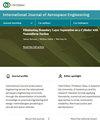由后缘吹风驱动的垂直离散阵风的数值模拟
IF 1.2
4区 工程技术
Q3 ENGINEERING, AEROSPACE
引用次数: 0
摘要
一种新型阵风发生器通过不稳定后缘吹拂的科恩达效应在风洞中产生气流振荡,已被证明在精确模拟离散阵风方面具有很强的潜力。为了优化设计性能和提高阵风模拟能力,有必要研究产生的阵风特性与这类装置的控制参数之间的关系。通过求解可压缩的非稳态雷诺平均纳维-斯托克斯(URANS)方程,提出了风洞中经过阵风发生器的亚音速气流的计算流体动力学模型。研究了喷流动量、频率和跨吹比对阵风强度、形状和空间均匀性的影响。结果表明,阵风强度与喷流动量和频率呈正相关。阵风的形状与归一化喷气动量系数曲线十分吻合。然而,当频率增加到 10 赫兹以上时,由于反向波峰的出现,阵风形状与预期有很大差异。此外,还揭示了侧壁和部分跨向吹风对阵风的影响机理。在三维情况下,流向涡旋分别在侧壁和吹风停止的跨度位置形成。这导致阵风振幅的增加和明显的不均匀性。当关闭侧壁附近跨度长度为 15%的吹风时,对称面上的阵风振幅增加了近 40%,原因是主涡旋更靠近主气流。这一结果为减少阵风衰减的操作提供了物理解释。本文章由计算机程序翻译,如有差异,请以英文原文为准。
Numerical Simulations of Vertical Discrete Gusts Driven by Trailing Edge Blowing
A new type of gust generator generates the airflow oscillation in the wind tunnel through the Coanda effect of the unsteady trailing edge blowing, which has been shown to have strong potential for accurately simulating discrete gusts. It is necessary to study the relationship between the generated gust characteristics and the control parameters of such devices in order to optimize the design performance and improve gust simulation capabilities. By solving the compressible unsteady Reynolds-averaged Navier–Stokes (URANS) equations, the computational fluid dynamics model of the subsonic airflow past the gust generator in the wind tunnel was presented. The effects of jet momentum, frequency, and spanwise blowing ratio on gust intensity, shape, and spatial uniformity were investigated. Results indicate that the intensity of gusts is positively correlated with jet momentum and frequency. The gust shape matches well with the normalized jet momentum coefficient curve. However, when the frequency increases to above 10 Hz, the gust shape differs significantly from expectation due to the appearance of reverse wave peaks. In addition, the mechanism of the impact of the sidewall and partial spanwise blowing on gusts was revealed. In the three-dimensional situation, streamwise vortices are formed on the sidewall and at the spanwise position where the blowing stops, respectively. This results in an increase and noticeable nonuniformity in gust amplitude. When the blowing with a 15% spanwise length near the sidewall is turned off, the gust amplitude at the symmetry plane increases by nearly 40% due to the main vortex being closer to the main flow. The result provides a physical explanation for the availability of this operation to reduce gust attenuation.
求助全文
通过发布文献求助,成功后即可免费获取论文全文。
去求助
来源期刊

International Journal of Aerospace Engineering
ENGINEERING, AEROSPACE-
CiteScore
2.70
自引率
7.10%
发文量
195
审稿时长
22 weeks
期刊介绍:
International Journal of Aerospace Engineering aims to serve the international aerospace engineering community through dissemination of scientific knowledge on practical engineering and design methodologies pertaining to aircraft and space vehicles.
Original unpublished manuscripts are solicited on all areas of aerospace engineering including but not limited to:
-Mechanics of materials and structures-
Aerodynamics and fluid mechanics-
Dynamics and control-
Aeroacoustics-
Aeroelasticity-
Propulsion and combustion-
Avionics and systems-
Flight simulation and mechanics-
Unmanned air vehicles (UAVs).
Review articles on any of the above topics are also welcome.
 求助内容:
求助内容: 应助结果提醒方式:
应助结果提醒方式:


